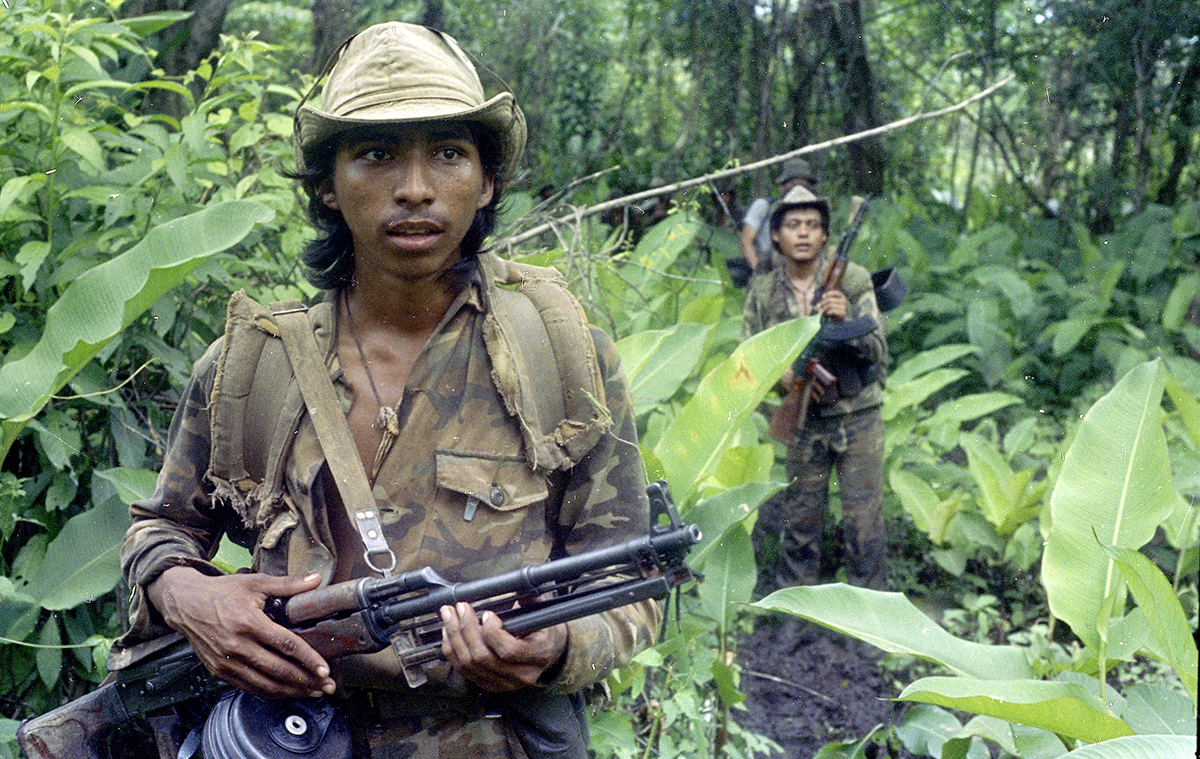
A Sandinista soldier looks for U.S.-backed contra rebels in Nicaragua
Investigative reporter Robert Parry, founder and editor of Consortiumnews.com, may be best known for breaking many of the stories related to the Iran-Contra affair in the 1980s. He received the 2015 I.F. Stone Medal for Journalistic Independence from the Nieman Foundation in October. Following is an edited excerpt of remarks he prepared for the award ceremony:
I admired I.F. Stone’s independent journalism way back in college. I even lobbied the school library to subscribe to his newsletter. Reading it weekly shaped how I came to view journalism—as a profession that required endless skepticism.
I had the privilege of meeting him in the early 1980s when I was an investigative reporter for the Associated Press (AP) in Washington. I had gotten hold of some classified records about financial misconduct in El Salvador. He called and asked if he could read the documents. I said sure, and he showed up at the AP office on K Street. Through his thick glasses, he spent a couple hours poring through the papers.
Though I shared Stone’s view that journalists should be the consummate outsiders, I came to the profession through a different route. I spent the first part of my career as a mainstream journalist. But I never forgot his insistence on maintaining your independence, whatever the pressures. To me, the core responsibility of a journalist is to have an open mind toward information, to have no agenda, to have no preferred outcome. That’s the deal you make with your readers, to follow the facts wherever they lead.
I consider this award a recognition of what we’ve accomplished at Consortiumnews.com over the past two decades. This honor goes to the many talented reporters and analysts who have written for us. They have made Consortiumnews.com a place where you can find thoughtful, well-researched, well-reported stories well worth reading nearly every day of the year.
For those of you who don’t know much about Consortiumnews.com, here’s a brief history. The project began out of my frustration with the mainstream news media. At AP, where I worked from 1974 to 1987, I was perhaps best known for breaking many of the stories that we now know as the Iran-Contra scandal. These included the first article about a little known Marine officer named Oliver North and—with my AP colleague Brian Barger—the first story about how some of the Nicaraguan Contras got themselves mixed up in the drug trade.
To say that these stories weren’t always popular would be an understatement. But they were well-reported and borne out when the Iran-Contra scandal exploded in late 1986. Sadly, I had burned many bridges at AP in the fights to push our stories to the wire.
I went on to work at Newsweek and then I worked on some documentaries for PBS Frontline. But it was becoming increasingly clear to me that the space for serious investigative journalism was closing down. With the arrival of Bill Clinton, there was a market for silly, tawdry scandals. There was even less interest in the unsolved mysteries of the 1980s—old, complicated stuff without much sex.
A key moment occurred in late 1994 when I got access to the files of a congressional inquiry into an Iran-Contra spinoff scandal. So I made copies and snuck them out of the Capitol. Next, I prepared a summary that I felt would change the history of the 1980s. But I couldn’t find anyone interested in publishing it.
One day in 1995 when I was grousing about this state of affairs, my oldest son Sam, who had just finished college, said that instead of complaining, why didn’t I publish my information on the Internet. He said there were things called websites. I really knew next to nothing about these matters, but I listened. Sam—though not a techie—figured out how to build a website. We launched our no-frills website in November 1995 as the first investigative magazine based on the Internet.
The original idea was to provide a home for neglected investigative journalists and their work. I thought I could raise significant amounts of money from a variety of sources, hence the clunky name Consortiumnews. But I soon learned that “independent journalism”—while popular in the abstract—is not something people really want to invest much in. They’d prefer to know how the stories are likely to come out. So we always struggled with money, but we did build a loyal readership that kept us going with small donations.
To my pleasant surprise, I discovered that a number of ex-CIA analysts were also looking for a place to publish their work. They shared our concern that the United States was veering away from fact-based policies. They felt that this decoupling from reality was careening the country toward international catastrophes. And they were right.
